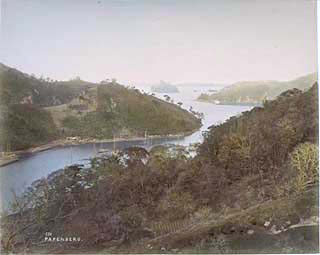Stillfried & Andersen

The firm of Stillfried & Andersen, also known as the Japan Photographic Association, was a photographic studio founded by Baron Raimund von Stillfried and Hermann Andersen that operated in Yokohama, Japan between 1876 and 1885.[1][2] The studio is noted for its portraits[3] and landscapes[4] that were often hand-coloured and presented in bound albums. The firm also produced photographic prints from negatives by Felice Beato.
History[]
After at least two visits to Japan in the early to mid-1860s, Austrian photographer and nobleman Baron Raimund von Stillfried became a resident of Yokohama in 1868, where it is believed he learned photography from Felice Beato.[3] In 1871, he established his own photographic studio, called Stillfried & Co..[2] In 1875, Hermann Andersen was listed as an employee of Stillfried & Co. but by 1876, Andersen had formed a partnership with Stillfried and so the firm was renamed Stillfried & Andersen.[5] Another incarnation of the firm was the Japan Photographic Association, under which name it was listed in 1875.[6] Until 1885 the firm operated under both names interchangeably.
In 1877, Stillfried & Andersen purchased the studio and stock of Felice Beato[7][8] and in the same year or shortly thereafter published Views and Costumes of Japan, which included photographs by Beato and Stillfried, as well as reprints of some of Beato's works.[4]
The partnership between Stillfried and Andersen was legally dissolved in 1878, though Andersen continued to run the studio under the same name of Stillfried & Andersen. In the subsequent years a number of legal battles and other entanglements ensued between the two, also involving Stillfried's brother, Franz von Stillfried. Around 1885, Kusakabe Kimbei obtained a quantity of Stillfried's original negatives,[9] which Kusakabe included in some of his albums in the late 1880s and the 1890s. The firm of Stillfried & Andersen was finally bought by Adolfo Farsari in 1885,[1] by which point neither Stillfried nor Andersen was resident in Japan. Farsari held the bulk of the firm's negatives,[1] only for them to be destroyed in a fire in 1886 along with all of Adolfo Farsari's own stock.[4]
Collections[]
Stillfried & Andersen photographs can be found in:
- the Royal Collection Trust,[10] United Kingdom
- the Canadian Centre for Architecture,[11] Montreal
- the Museé Guimet, Paris.[12]
Notes[]
- ^ Jump up to: a b c Terry Bennett (3 July 2012). Photography in Japan 1853-1912. Tuttle Publishing. pp. 341–. ISBN 978-1-4629-0708-3.
- ^ Jump up to: a b Eleanor M. Hight (2011). Capturing Japan in Nineteenth-century New England Photography Collections. Ashgate Publishing, Ltd. pp. 65–. ISBN 978-1-4094-0498-9.
- ^ Jump up to: a b Susan B. Taylor; Peabody Museum of Archaeology and Ethnology; Wellesley College. Museum (1988). A Timely encounter: nineteenth-century photographs of Japan : an exhibition of photographs from the collections of the Peabody Museum of Archaeology and Ethnology and the Wellesley College Museum. Peabody Museum Press.
- ^ Jump up to: a b c Terry Bennett (19 February 2013). Early Japanese Images. Tuttle Publishing. pp. 62–. ISBN 978-1-4629-1137-0.
- ^ Terry Satsuki Milhaupt (15 May 2014). Kimono: A Modern History. Reaktion Books. pp. 154–. ISBN 978-1-78023-317-8.
- ^ Listed in the "Japan Gazette" Hong List and Directory of 1875. Gartlan, 142, 181.
- ^ Asia. Asia Society. 1979.
- ^ Anne Lacoste; Felice Beato (2010). Felice Beato: A Photographer on the Eastern Road. Getty Publications. pp. 123–. ISBN 978-1-60606-035-3.
- ^ C. Worswick (1979). Japan: Photographs, 1854 to 1905. Knopf Doubleday Publishing Group. ISBN 978-0-394-50836-8.
- ^ "Stillfried & Andersen : Yokohama, Japan (fl.1870s-1880s) - Prince Henry of Prussia, Japan, 1879 [in Portraits of Royal Children Vol.25 1879-80]". www.rct.uk.
- ^ Canadian Centre for Architecture. "Search Results". www.cca.qc.ca. Retrieved 2020-05-22.
- ^ "Stillfried & Andersen, un album de transition - Japon, photographies anciennes conservées au Musée Guimet, Paris". www.guimet-photo-japon.fr.
References[]
- Clark, John. Japanese Exchanges in Art, 1850s to 1930s with Britain, continental Europe, and the USA: Papers and Research Materials (Sydney: Power Publications, 2001).
- Dobson, Sebastian. "Yokohama Shashin". In Art & Artifice: Japanese Photographs of the Meiji Era – Selections from the Jean S. and Frederic A. Sharf Collection at the Museum of Fine Arts, Boston (Boston: MFA Publications, 2004), 15-28, 37.
- Edel, Chantal. Mukashi, Mukashi: Le Japon de Pierre Loti, photographies par Beato et Stillfried (Paris: Arthaud, 1984), 15.
- Gartlan, Luke. "A Chronology of Baron Raimund von Stillfried-Ratenicz (1839-1911)". In Japanese Exchanges in Art, 1850s to 1930s with Britain, continental Europe, and the USA: Papers and Research Materials (Sydney: Power Publications, 2001), 125-.
- Gartlan, Luke. A career of Japan : Baron Raimund von Stillfried and early Yokohama Photography (Leiden, The Netherlands : Brill, 2016).
- Handy, Ellen. "Tradition, Novelty, and Invention: Portrait and Landscape Photography in Japan, 1860s-1880s". In A Timely Encounter: Nineteenth-Century Photographs of Japan (ex. cat.; Cambridge, Massachusetts: Peabody Museum Press, 1988), 57.
- Rosenberg, Gert. Wilhelm Burger: Ein Welt- und Forschungsreisender mit der Kamera: 1844-1920 (Vienna: Christian Brandstätter, 1984), 25-26.
- Rosenblum, Naomi. A World History of Photography (New York: Abbeville Press, 1984), 172.
- Turner, Jane, ed. The Dictionary of Art, vol. 29 (New York: Grove, 1996), 663.
- Portrait photographers
- Photographic studios
- 19th-century photographers
- Photography companies of Japan